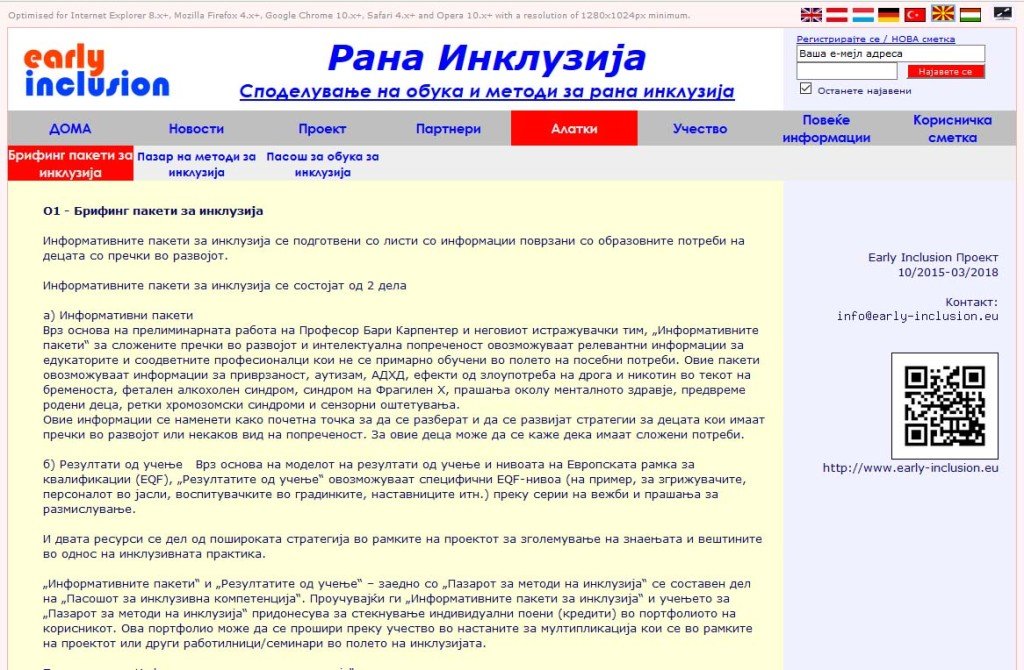The UN Convention on the Rights of Persons with Disabilities ratified by most European countries foresees an inclusive education for all. Within this context most European countries have expressed their political will to implement the inclusive philosophies and concepts at all levels of policy and services related to issues for persons with disability (The European Union strategy for smart, sustainable and inclusive growth; EU Disability Strategy 2010-2020). However, a significant lack of methodologies and sharing knowledge in this field can be observed. Professionals report high need for information, training and concrete resources. Therefore, a project consortium of ten partners on European level has been created, that began to implement a project “Early Inclusion”. The Republic center – PORAKA is one of the project partners, which is implemented within the Erasmus+ Programme of the European Union. The project focuses on increased knowledge and shared methods concerning for pre-school age children who have a disability or are at risk of becoming disabled. It aims to transfer information, concrete methodologies and competence assessments.
INFORMATION
Information is about what children with disability need and how professionals can support them in mainstream education in order to avoid later exclusion and failure. Information is shared through Inclusion briefing packs. These packs are consisted of two parts:
• Information sheets related to educational needs of children with special needs concerning autistic spectrum conditions, fetal alcohol spectrum disorders, sensory impairments, rare chromosomal disorders, premature birth, mental health, fragile X syndrome, effects of drug use, attention deficit hyperactivity disorder and attachment.
• Specific exercises and reflection questions – based on Learning outcome model and levels of the European Qualification frame.
Information sheets, specific exercises and reflection questions are already available at the web page created within this project.
CONCRETE METHODOLOGIES
The concrete methodologies refer to exchange of perceived good every day practice and through sharing of relevant experiences among the professionals that work with children in the educational process. The exchange of concrete methodologies shall be realized by Inclusion Method Market that will soon be available on the web page of the project. The Inclusion method market is “self-organized methodological online exchange market-place”. Professionals from diverse sectors are invited to describe/upload successful inclusive situations. These concrete situations serve as a methodological pool of ideas and learning opportunities for other users.
COMPETENCE ASSESSMENT
The competence assessment refers to informal learning on the work place towards inclusion. The assessment shall be performed through an Inclusive Training Passport. This passport serves as a platform to make informal learning processes transparent and enable a link to current EU initiatives in the field of certification and equivalence. The online tool monitors the self-organized learning activities (e.g. self-organized learning based on the briefing packs, exchange activities within the market place) and includes tried and tested, practical training activities. By gaining the Inclusive Training Passport, the project beneficiaries can collect individual credits to their portfolio.
Studying the “Inclusive Briefing Packs” and learning about the “Inclusion Method Market” contributes to gaining individual credits in their portfolio. This portfolio can be widened by taking part in face-to-face multiplier events within the project or other workshops/seminars within the field of inclusion.
More about project consortium, products, tools, dissemination, events, participation and useful links can be found at: www.eurly-inclusion.eu and office@sinn-evaluation.at
Materials are available in English, German, French, Hungarian, Macedonian and Turkish language.



